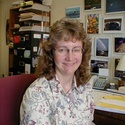Lakebed
“If my father were here, on the brink of the U.N. climate talks, he’d be dismayed to see the Earth in such a precarious position.”
The year I graduated from high school the country wrapped itself in the flag for the nation’s bicentennial. Everything turned red, white and blue in 1976. I turned 18 in July and began college after Labor Day. I voted for a Georgia peanut farmer in my first presidential election in November.
My family lived on the west side of Folsom Lake in a modest home my parents purchased a decade earlier. The summer after we moved in, my father hitched our small boat behind his blue Chevy and drove it up the curvy slope to the state park entrance. Then he and my mother plopped my sister and me in the big blue lake and taught us to waterski.
By 1976, we were serious water people. Summers found my sister and me lifeguarding and teaching swimming at the pool in town. Evenings after work, Dad would drive the boat, and we’d ski into late sunsets.
But that summer we couldn’t waterski. The lake level had dropped and kept dropping. We’d watched several dry years wither the lake to a trickle. Folsom Dam, built in the mid-1950s to keep Sacramento from flooding, stood like a towering wall with too many gaping mouths, the spillways through which water had once passed.
I wrote a story for a journalism class that fall and learned that the lake hadn’t been so low since the dam was built.
This year that lakebed is nearly as empty as it was in 1976, and I think of my father, a Korean War veteran who put up the flag for every holiday, who died in 2004. He began preaching the gospel of conservation in the mid-’70s.
“Shut off the tap while you’re brushing your teeth,” he’d advise. “Turn off lights when you leave the room.”
He stopped stringing Christmas lights outside. We started recycling newspapers, bottles and cans. We carpooled in ever-smaller cars.
“We have to,” he’d say. “We’re using up our resources. We don’t do water well in California—we either have too much or too little.”
If my father were here, on the brink of the U.N. climate talks, he’d be dismayed to see the Earth in such a precarious position. He didn’t consider himself an environmentalist, but he understood climate change long before we knew the term.
I can hear him now: “It’s the only planet we’ve got. We have to take care of it. It may already be too late, but we’ve got to try harder. We’ve got to do better.”








